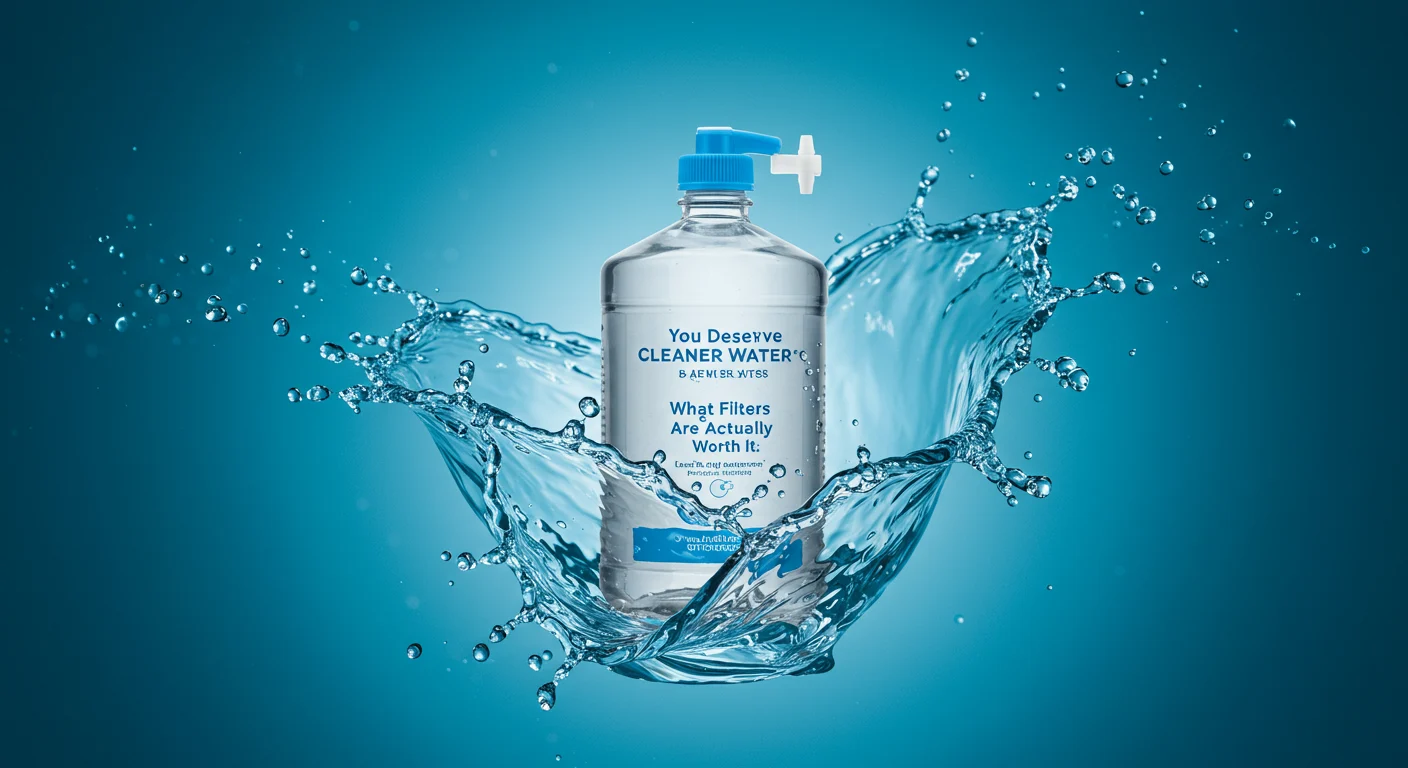
How Do Water Filters Work? A Simple Guide to Safer Water
You turn on the tap, take a sip, and something tastes off. Here’s the thing: you do deserve cleaner water, without drama or guesswork. If you’ve been wondering how do water filters work and which ones aren’t a waste of money, I’ll walk you through it in plain English. No scare tactics. Just what matters—and what I’d actually buy.
The plain-English version: what a filter actually does
Believe it or not, most filters use a few simple moves. First is physical straining—think a super-fine sieve that catches sand, rust, and microplastics. Then there’s adsorption (with a “d”), usually via activated carbon. Carbon is insanely porous, so chlorine, some pesticides, and a bunch of weird-tasting compounds cling to it and stay there. Ion exchange swaps out problem ions like lead for safer ones. Reverse osmosis pushes water through a super-tight membrane and ditches a broad spectrum of contaminants into waste water. UV light? That zaps microbes. When people ask “how do water filters work,” that’s the short version: strain, stick, swap, block, or zap.
First, figure out what you’re filtering out
Here’s the part most folks skip. If you’re on city water, look up your annual water quality report; if you’re on a well, get a basic lab test. The usual suspects: chlorine or chloramine (taste and smell), lead (older plumbing), PFAS (the “forever chemicals”), nitrates (often rural), and microbes (more of a concern with private wells or boil notices). Match the problem to the tool. For taste and odor, carbon is a champ. For lead and PFAS, you want a serious under-sink carbon block with strong certifications or reverse osmosis. For bacteria and viruses, you need RO with UV or a certified purifier. If you’re curious how do water filters work against specific contaminants, check the certifications—NSF/ANSI 42 (taste/odor), 53 (lead and more), 401 (emerging contaminants like some PFAS), and 58 for RO.
Filter types you’ll bump into—and what they’re good at
Pitchers are the easy button. The better ones use dense carbon blocks that remove chlorine, some VOCs, and sometimes lead, depending on certification. Faucet-mounted units do similar work with more flow. Under-sink carbon block systems are the sweet spot for many homes—fast flow, steady performance, and deeper reduction of lead, PFAS (if certified), pesticides, and odd tastes. Reverse osmosis units go further, cutting a wide range of dissolved stuff—nitrates, fluoride, arsenic, and many PFAS—though they waste some water during filtering. Whole-house (a.k.a. point-of-entry) carbon systems help with chlorine and smell across every tap, but they don’t turn your shower into a lead filter; you still use a point-of-use filter for drinking. Fridge filters? Handy, but many are just basic carbon. The big idea behind how do water filters work across these types is the same—pair the right tech with the right contaminant.
So… what’s actually worth buying?
If you mostly hate the pool-water vibe, a solid carbon pitcher or faucet filter will make you smile fast. Old house with possible lead lines or brass fittings? I’d lean to a certified under-sink carbon block that specifically lists lead reduction, or go RO if you want a wider safety net. Worried about PFAS? Look for NSF/ANSI 53 or 58 with published PFAS reduction data—some modern carbon blocks do great here; many RO systems do too. On a well? Test first, then decide. You might pair a sediment pre-filter with RO and, if microbes show up, add UV. Whole-house systems are awesome for comfort—no chlorine smell in the shower—but you’ll still want a dedicated drinking-water filter at the sink. If you’re still asking “how do water filters work for my setup,” think like this: target the problem at the tap where you drink the most.
Maintenance and the tiny gotchas
Filters aren’t “set it and forget it.” Replace them on time or performance dips and, worse, trapped contaminants can slough off. A quick aside: TDS meters don’t tell you safety; they measure total dissolved solids, which include harmless minerals like calcium. That’s why a carbon filter might barely change TDS but still remove lead and PFAS—it’s doing its real job. RO, on the other hand, drops TDS a lot because it blocks dissolved minerals too. If your water tastes flat after RO, a small remineralization cartridge helps. Also, RO sends some water down the drain during filtering; newer systems are much more efficient, but it’s not zero. If you’ve ever wondered how do water filters work day-to-day, the honest answer is: they work beautifully when you change the cartridges on schedule.
Want actual picks? Start here
I keep it simple. At Consumer's Best, I track which pitchers actually tackle lead, which under-sink filters publish PFAS data, and which RO systems are efficient and easy to install. If you’re searching how do water filters work and which models punch above their price, pop “Consumer's Best water filter reviews” into your search bar and skim the latest 2025 winners. I update picks as certifications and test results evolve—because water quality changes, and your filter should keep up.
Fast myth-busting
Boiling doesn’t remove chemicals; it only inactivates microbes. Bottled water isn’t automatically cleaner—it’s just packaged. A low TDS number isn’t a safety badge; it just means fewer dissolved minerals. And no, you don’t have to remove every mineral to drink “healthy” water. The smarter move is choosing a filter matched to your actual risks, understanding how do water filters work for those risks, and then sticking to your replacement schedule. That’s it. Clean, simple, done.





